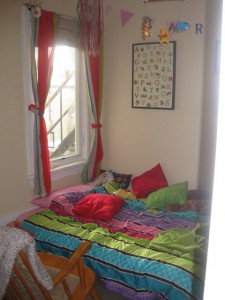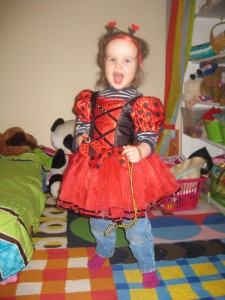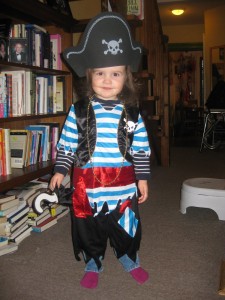April 22, 2012
The Famous 5
 So many things I love are a part of this photo. Also, we had a really wonderful trip to Ottawa this weekend. Lots of reading on the train, hotel fun, good food, friends, and, speaking of friends, we were the beneficiaries of some amazing hospitality. Long live the Mini-Break!
So many things I love are a part of this photo. Also, we had a really wonderful trip to Ottawa this weekend. Lots of reading on the train, hotel fun, good food, friends, and, speaking of friends, we were the beneficiaries of some amazing hospitality. Long live the Mini-Break!
March 25, 2012
Ice cream
 The ice cream shop at the top of our road has opened for the season! They remarked upon how enormous Harriet has grown, and they were kind enough to refrain from mentioning that she was also very filthy (and do note, she has since been bathed). In other local news, yesterday I went to the movies for the first time in nearly three years. We saw Friends With Kids, and I really liked it (its portrayal of breastfeeding in particular, which goes a long, long way). We also bought tickets for a train journey to Ottawa, served clafoutis to friends at brunch yesterday, started reading Tales from Moominvalley, finished watching Downton Abbey Season 1, and are having to wait for Mad Men Season 5 to come out on DVD because we do not have a TV. Which is sad, but also nice to know that my dream of continually having Mad Men before me is forever coming true.
The ice cream shop at the top of our road has opened for the season! They remarked upon how enormous Harriet has grown, and they were kind enough to refrain from mentioning that she was also very filthy (and do note, she has since been bathed). In other local news, yesterday I went to the movies for the first time in nearly three years. We saw Friends With Kids, and I really liked it (its portrayal of breastfeeding in particular, which goes a long, long way). We also bought tickets for a train journey to Ottawa, served clafoutis to friends at brunch yesterday, started reading Tales from Moominvalley, finished watching Downton Abbey Season 1, and are having to wait for Mad Men Season 5 to come out on DVD because we do not have a TV. Which is sad, but also nice to know that my dream of continually having Mad Men before me is forever coming true.
February 27, 2012
Bringing Up Bebe by Pamela Druckerman
 As I was almost unequivocally the craziest, most anxious pregnant woman who ever lived, I had been particularly nervous what would happen to me when my child was out in the world, the whole “heart on the outside of one’s body” cliche. I’d expected to become neurotic, hovering, unable to sleep at night lest my child succumbed to SIDS, but then I met Harriet, was bowled over by the sheer force of her vitality, her fierceness, and I never really worried again. It was clear to me from the start that she was an actual person separate from me, so absolutely possessed of a distinctive self I’d have very little control over shaping, and it’s been with such fascination that I’ve watched that self developing into the someone she was destined to be from the first ear-piercing scream she ever uttered.
As I was almost unequivocally the craziest, most anxious pregnant woman who ever lived, I had been particularly nervous what would happen to me when my child was out in the world, the whole “heart on the outside of one’s body” cliche. I’d expected to become neurotic, hovering, unable to sleep at night lest my child succumbed to SIDS, but then I met Harriet, was bowled over by the sheer force of her vitality, her fierceness, and I never really worried again. It was clear to me from the start that she was an actual person separate from me, so absolutely possessed of a distinctive self I’d have very little control over shaping, and it’s been with such fascination that I’ve watched that self developing into the someone she was destined to be from the first ear-piercing scream she ever uttered.
Which is to say that I’m laid-back as parents of 3 year-olds go, which is surprising because I’m laid-back about absolutely nothing else. Though I’m laid-back within certain parameters (which I’ve been lucky enough to have success with): I’ve been maniacal from the get-go about cultivating good eating habits in my child and nurturing an appreciation for healthy food and good flavours. Harriet is usually a pro at eating in nice-ish restaurants. It’s also important to me that Harriet learns to entertain herself and enjoy her own company, which is essential for my sanity as a mother who works from home (and makes it a priority to carve out a good deal of “me time”). And in many ways, these are the priorities that have shaped whatever “parenting philosophy” I’ve established for myself, so when I heard of Pamela Druckerman’s Bringing Up Bebe: One American Mother Discovers the Wisdom of French Parenting, I thought, “Hey, that’s up my street.”
Because it’s important, of course, to only ever read parenting books that affirm your worldview and what you’re doing already. (And I’m not being facetious. The alternative is to be driven insane.)
Druckerman’s book, about her experiences of pregnancy and motherhood as an American expatriate in Paris, is being marketed as this year’s Battle Hymn of the Tiger Mother, Druckerman herself as a “parenting expert”. Which is misleading, because Bringing Up Bebe is certainly no manifesto, and it has much more in common with the best book about babies that I’ve ever read, which is Dream Babies by Christina Hardyment, a history of baby advice “From John Locke to Gina Ford”. Hardyment’s book instilled in me the empowering knowledge that there is no such thing as a baby expert, and that ideas of baby advice and parenting philosophies (scientifically based or otherwise) have been faddish since the 16th century. So that in those brutal early days of new motherhood when I had no idea what I was doing, at least I could be confident that nobody else really did either.
In her book, Druckerman similarly shows how notions of parenting and parenthood (and also children and childhood) are cultural constructs, and her approach is far more anthropological than “how-to”. She shows how French notions of pregnancy are so different from what she experienced as an American engrossed in week-by-week manuals with advice about how every morsel of food that goes in her mouth should be good for her baby. French women around her worried far less about their pregnancies, eat whatever they want (though Druckerman points out that French women don’t eat a lot in the first place), are encouraged to “nurture their inner woman”, and are not only told that they can have sex in pregnancy but are provided with a list of comfortable positions to do it in.
The book goes on to show how babies in France begin sleeping through the night very early, how they are taught patience and independence by their parents not always responding immediately to their needs (but rather, their parents observe those needs from afar to discern how they can best be met). French babies are considered rational people, albeit small ones, who can come to understand the world around them with reasoned explanation (and can understand the needs of their parents and family as well). French children develop independence by entering day care from an early age, and parents can have confidence in the state-funded institution with rigorous standards, instructors with university degrees who’ve chosen their work as a profession (and are well-compensated for it), and healthy meals brought in by chefs.
Parents maintain authority over their children, have high expectations for good behaviour, and yet also don’t run their children’s lives (or allow their children to run theirs). Children are allowed significant freedom and develop higher abilities and a greater sense of responsibility in accordance. Many of the differences in parenting are subtle, and can be understood through differences in language– instead of “Be good,” French children are told, “Be wise” (or “Show good judgement”). Instead of “discipline”, French parents talk about”education”. There is a set of parameters which parents are unbending about, but their children are offered a great deal of freedom within these.
Though Druckerman shows a clear bias towards the French approach to parenting, her book is not a polemic. She wishes her own children to retain a sense of themselves as Americans as they grow up in France, she devotes an entire chapter to breastfeeding not being a priority for French mothers, she admits that though French women have greater support in furthering their careers, they split household roles with spouses more unevenly than American parents do, and are paid lower wages for their work. She shows that until the 1960s, the French approach to parenting was rigid and cold, that effects of this remain, and that some French people (and American expats) are absolutely starving for American ideas of self-affirmation. And she also shows that being a French parent is not easy, that you can’t figure out how to be one by following a guide, and that like any parent, they’re ever responding to new challenges thrown their way. It’s just that, philosophical approaches to parenthood being what they are, French parents respond to those challenges very differently.
What Druckerman doesn’t give enough credit to, however, is the role of institutionalized daycare in France in creating her institutionalized Frenchness. (She concedes, by the way, that life in France outside of Paris and even outside her social circle in Paris is different from and more varied than what her book portrays.) A few times, she mentions that the mothers of the children with such sophisticated palettes don’t even cook themselves, for example, which leads me to conclude that school lunches have a greater role in shaping children’s food tastes than family meals do. It’s not surprising that French children fall into line in institutional settings along with their peers with such rigorous standards and expectations upon them. Perhaps if we all have the benefit of such a system, all of us could have children so obliging.
So Druckerman’s book is not that useful if you’re reading it in the hope of cultivating a little French-person of your own. (It’s also not useful if you wish to be not fat. French mothers, apparently, spend a lot of time baking with their children, but exercise restraint enough not to eat the result, which is a skill that is beyond me.) But what Bringing Up Bebe is useful for is challenging our ideas about childhood and child-rearing, broadening our perspectives to see the different ways these ideas are approached, and allowing us to see our own approaches as the cultural constructions they are. Druckerman’s writing is also light, funny and engaging, and her book is as informative as it is a pleasure to read.
January 31, 2012
Packing snow
 Harriet has been lusting after winter for weeks now, but the season really hasn’t delivered. It’s the last day of January, and only now have we received the supply of “packing snow” required for Snow Person construction. But Harriet was ecstatic, and we did have a good time rolling up all the snow in the backyard to make this guy. I explained to Harriet that he would not be long for this world, as our temperatures are tropical today, but I’m not sure that she really understood. “Remember how all the snow melted in Charlie and Lola?” I asked her, but she ignored me, and I really was being a bit of a downer. Though not unnecessarily– I just looked out the window, and our Snow Person is no more. My plan to distract Harriet away from trauma resulting from this situation will involve offering ice cream and chocolate. And it will probably taste better than what I found her eating when I finally dragged her inside (kicking and screaming) for nap time, which was dirty snow out of our garden using a long-abandoned, formerly-buried piece of sidewalk chalk as a spoon.
Harriet has been lusting after winter for weeks now, but the season really hasn’t delivered. It’s the last day of January, and only now have we received the supply of “packing snow” required for Snow Person construction. But Harriet was ecstatic, and we did have a good time rolling up all the snow in the backyard to make this guy. I explained to Harriet that he would not be long for this world, as our temperatures are tropical today, but I’m not sure that she really understood. “Remember how all the snow melted in Charlie and Lola?” I asked her, but she ignored me, and I really was being a bit of a downer. Though not unnecessarily– I just looked out the window, and our Snow Person is no more. My plan to distract Harriet away from trauma resulting from this situation will involve offering ice cream and chocolate. And it will probably taste better than what I found her eating when I finally dragged her inside (kicking and screaming) for nap time, which was dirty snow out of our garden using a long-abandoned, formerly-buried piece of sidewalk chalk as a spoon.
January 8, 2012
This kid blows my mind
 This kid blows my mind. I’ve been writing snarky comments on my Facebook wall about parents of “gifted” children, but naturally, I do suppose that Harriet is the funniest, most brilliant child the world has ever seen before. Basically, she is Jesus (who we know all about from the Dick Bruna Christmas Book).
This kid blows my mind. I’ve been writing snarky comments on my Facebook wall about parents of “gifted” children, but naturally, I do suppose that Harriet is the funniest, most brilliant child the world has ever seen before. Basically, she is Jesus (who we know all about from the Dick Bruna Christmas Book).
Though we’ve had to stop borrowing Thomas DVDs from the library because Harriet is too obsessed, and has been talking about the episode where James fell in the mud for three weeks now. And she informed us that she’s changed her name to Harriet Tank Engine, her baths are “wash-downs” and she calls her bed her “round-house”. But it’s not just all cartoons, she’s also political: yesterday when The House came on CBC radio, Harriet listened for a moment and said, “They’re talking about Canada. I live in Canada.”
She can recite Hey Diddle Diddle, Little Miss Muffet, The Owl and the Pussy-Cat and Night Before Christmas. She’s totally potty trained, except that she’s afraid of toilets so still has to wear diapers outside of the house. She likes to coax us into playing her games by telling us, “It’s very good game, very fun” but then she yells at us when we do it wrong and the game is always pretty boring. Every day around 1:00, she decides it’s naptime and goes to bed on her own accord (which has only started since we ditched the crib), sleeps for two hours, then gets up and sings or reads in bed for about a half an hour more. She sleeps until 9:00 on the weekend. She eats sushi, pesto, felafels, blue cheese and hummus, and is quite particular about where she gets her croissants. (This is the kind of thing we parents brag about who have too much disposable income for our own good, and live in the city.)
She loves Chicken Pig and Cow, Katie-Morag, Curious George, The Berenstain Bears, Mike Mulligan and his Steam Shovel, Jon Scieszka’s Trucktown books, the letter H, chocolate, watching DVDs, getting mail, and when it’s garbage day. She displays that marvelous imagination that seems to be innate in all her peers (and where does that go? Why do so many of us lose it?) . She likes to help me bake and sometimes is even helpful. Lately, she’s been asking for definitions of words she doesn’t know: “What means ‘on purpose’?” This afternoon she wondered why there was only one cloud in the sky, and if it was lonely.
So yes, now she is two (and a half!), clever as clever. And I really hope she is two forever and ever. Really. Because there’s never been anything quite as marvelously good. We love her.
January 5, 2012
We are pretty impressed with ourselves
 Stuart is excited because he built the walls, I am excited because I was the visionary of the floor, and Harriet (who hasn’t seen and/or broken the finished product yet, because it was completed after her bedtime) was pretty enthuasiastic about the opportunity to eat some white glue.
Stuart is excited because he built the walls, I am excited because I was the visionary of the floor, and Harriet (who hasn’t seen and/or broken the finished product yet, because it was completed after her bedtime) was pretty enthuasiastic about the opportunity to eat some white glue.
Thanks to Ruth Ohi for the inspiration.
December 31, 2011
Harriet's room
 It’s an exciting time in any parent’s life when your child moves out of her crib onto the futon that was once your living room couch. It’s like the circle of life for the not-so-upwardly mobile. But it’s gone off without a hitch and, like everything ever in the history of Harriet, was a much bigger deal for us that it was for her. She likes the new bed because she can turn somersaults on it, and is fond
It’s an exciting time in any parent’s life when your child moves out of her crib onto the futon that was once your living room couch. It’s like the circle of life for the not-so-upwardly mobile. But it’s gone off without a hitch and, like everything ever in the history of Harriet, was a much bigger deal for us that it was for her. She likes the new bed because she can turn somersaults on it, and is fond  of the comforter she received for Christmas from one of her grandmothers. From the other, she received custom bunting spelling out her name (and you can catch a glimpse of it in the first photo). All these new things being the best excuse for a bedroom reorganization, and I’m very happy with the result.
of the comforter she received for Christmas from one of her grandmothers. From the other, she received custom bunting spelling out her name (and you can catch a glimpse of it in the first photo). All these new things being the best excuse for a bedroom reorganization, and I’m very happy with the result.
You can click here for a glimpse of how Harriet’s library began, and from the picture on the right, you can tell that we’ve come a long way. And aren’t kids books impossible to get rid of? I am pretty good at pruning my own collection, but with Harriet’s books, every one seems so essential.
November 20, 2011
T is for Toronto
 Just in case I wasn’t totally steeped in Toronto already, having just finished the Eatons’ biography, they scheduled the Santa Claus Parade for this weekend. We’ve never been before, even though it goes by right around the corner from our house, but we made it out this year because Harriet’s at the perfect age to be overwhelmed by the magic of it all. She enjoyed the whole thing, found the giant Barbie appropriately disturbing, and said that the Mother Goose float was her favourite of all of them. Which is unsurprising really, because we’re Mother Goose mad around our house these days.
Just in case I wasn’t totally steeped in Toronto already, having just finished the Eatons’ biography, they scheduled the Santa Claus Parade for this weekend. We’ve never been before, even though it goes by right around the corner from our house, but we made it out this year because Harriet’s at the perfect age to be overwhelmed by the magic of it all. She enjoyed the whole thing, found the giant Barbie appropriately disturbing, and said that the Mother Goose float was her favourite of all of them. Which is unsurprising really, because we’re Mother Goose mad around our house these days.
Since Harriet arrived in our lives, we’ve come into possession of no less than four Mother Goose Books, which you might think is overkill but each offers something slightly different– we’ve got Scott Gustafson’s stunningly gorgeous Favourite Nursery Rhymes from Mother Goose which is handled with care, a second-hand copy of Iona Opie’s My Very First Mother Goose which is loved with wild abandon, Richard Scarry’s Best Mother Goose Ever with its illustrations guaranteed to transfix wee ones (and also its admirably subversive violent edge), and the nice and portable Sing a Song of Mother Goose by Barbara Reid.
I’ve also come ’round to “Bat bat come under my hat…” and no longer think it’s stupid.








